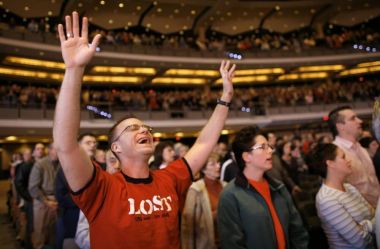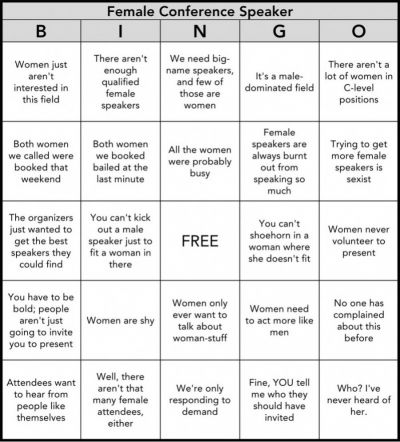Great White Hope - Or What Christian Conferences Might Still Be Missing

Another day, another Christian conference. This one declares hope for the nations in times when it may seem lost, which is great. Hope is certainly needed. What's less hopeful is that it will be delivered by seven mostly pale skinned men and a lone woman. The marketing for the event rolls on alongside coverage of the US presidential elections, and indeed some of those on the line up are flying over from America for the occasion. Some come from ministries related to Bethel Church in Redding, from where support for Donald Trump emerged earlier this year. Why does this matter? Does what happen on ministry conference platforms have anything to do with political power and influence? The short answer is yes.
When presidential debates and wider conversations hinge on Donald Trump's disrespect of women, black people, people with disabilities, and any other minority group you might care to mention, it matters what churches of influence say, and it matters who says it. While sidestepping direct political comment and focusing on purely spiritual matters, an event purporting to be about hope for the nations delivered by a group that doesn't represent many in the nation has a hollow ring. The inference is that it's the men who matter, their voices that declare the priorities, it is they who have spiritual authority, and although this may be unintentional it should be examined. In many Christian circles, default male presence is the norm. Either intentional – as God intended – or just how it is, and for the latter the continuation depends on a polite male supremacy that means line ups like this are released without any perception they could be improved. Women as tokens is acceptable.
The world of Trump seems far away from all this and yet – the majority of Christian leaders publicly dropping or reinforcing their support for him are men, while the trigger for this new upheaval is women. It is male leaders who debate whether a boastful admission of sexual assault is make or break for them. What message does this send to women both inside and outside Christianity? It's certainly no advert for the faith. Prominent female leaders have spoken up with no holds barred about why this matters to them, and the effect on women. Their words are personal – not falling back on listing female relatives to show why they're invested. Bible teacher Beth Moore said "I'm one among many women sexually abused, misused, stared down, heckled, talked naughty to. Like we liked it. We didn't. We're tired of it." She has been echoed by Christine Caine, among others.
While mainstream Christian events continue to field all or predominantly male line ups they reflect the world they hope to influence rather than model a different way. This should be challenged. The conference has an FAQ page on its website yet 'Why so many men?' – one of my frequently asked questions when looking at Christian conference line ups – isn't there. In order to ask why, one has to take to twitter, or write a piece like this. To be the one making a fuss, asking for change, well, it's just not very seemly, is it? Better to focus on the message, the hope, unity, Jesus, and pretend it doesn't matter. The answers on gender imbalance from organisers could be lifted from a handy little picture known as the Women Speaker Bingo Card, which emerged from other sectors where women didn't get to talk.

As the bingo card insists, people want the best speakers, not tokenism, so it stands to reason if great women existed they'd be there. Another line up with just one woman – this time a British-led event organised by Soul Survivor – responded to the "Why so many men?" query on social media this week with the assurance that they'd asked some women but none of them could make it (another bingo card favourite).
@God_loves_women Hey, we've invited a number of women who unfortunately aren't able to make it & we're waiting to hear back from others too
— NSN (@NSNconf) October 10, 2016
Being involved in both Project 3:28, a collective working towards gender balanced platforms, and the Gathering of Women Leaders, women who are brilliant, capable, inspiring communicators in all fields of faith and life are hard to avoid. They pop up everywhere, in between writing books, academic study, ministry, pastoring, teaching, running organisations and all the things men do that qualify them as must-have speakers. There are fewer of them, because Christian culture hasn't encouraged, enabled or released them as it has men. Many are not invited as often because they're not as well known, and a small number are invited to almost everything because they are already visible.
This leaves questions for conference organisers, particularly those with large churches and ministries: where are the women you're raising up to speak? Where especially are the ones not related to you? Will you make room for women as your equals not as added extras? How far are you prepared to look beyond your doors and expand your networks, friendships and relationships to reflect the nation you live in? How much are you prepared to change to create a church that really offers hope to people who don't look like you? In times like these, anything less won't do.
Vicky Walker is a writer and speaker, among other things. She is author of 'Do I have to be good all the time?' and is currently writing a book on how to navigate Christian culture's teaching on dating, relationships and marriage (you can complete her research survey here).











